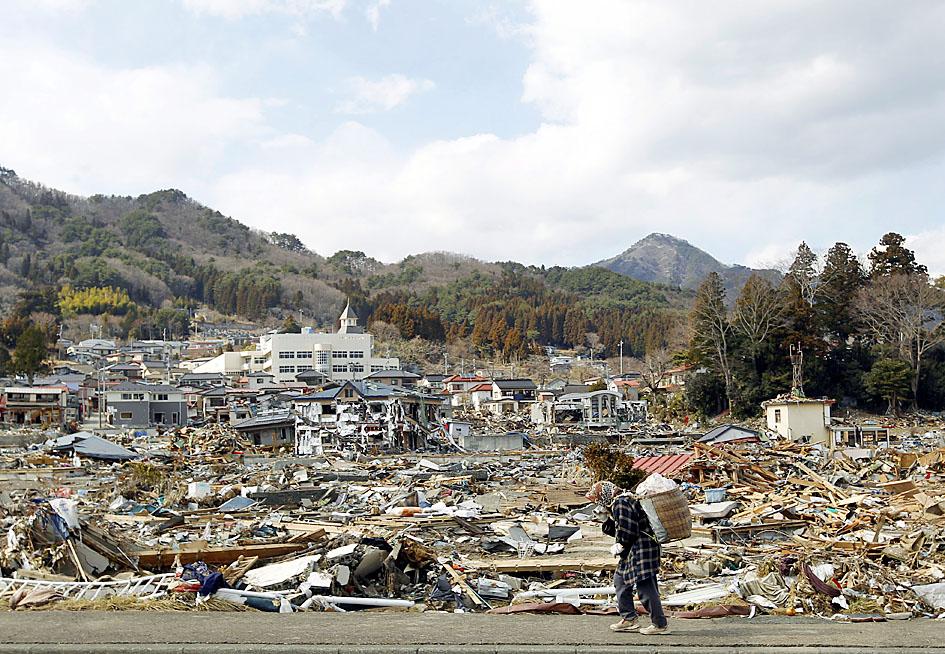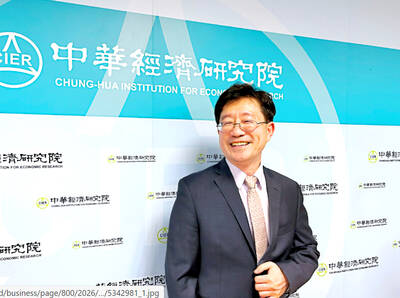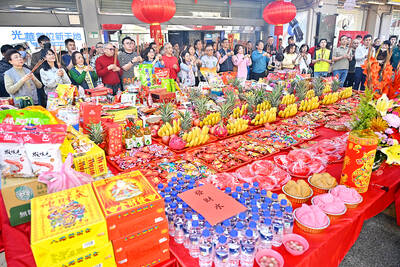A team of Taiwanese experts are to travel to Japan to examine Tokyo’s plans to release contaminated water from the disabled Fukushima Dai-ichi nuclear power plant into the ocean, the Atomic Energy Council said on Monday.
The team would likely make the trip by the end of this year, council Minister Hsieh Shou-shing (謝曉星) said, adding that Tokyo has agreed to the trip in principle.
The team is similar to an investigative task force led by the International Atomic Energy Agency (IAEA) that would also investigate Japan’s plans, Hsieh told reporters after briefing lawmakers on the matter at the Legislative Yuan.

Photo: EPA
IAEA officials have the authority to enter the power plant’s premises to inspect the work being conducted there, and the Taiwanese team would carry out an on-site inspection covering the same items on the IAEA’s itinerary, including water release information and monitoring measures, Hsieh said.
Some IAEA representatives have already visited Japan and the agency plans to send its investigative team by the end of the year, he added.
The council has been coordinating with the Ministry of Foreign Affairs and Taiwan’s representative office in Japan to negotiate the planned visit with Japanese officials, he said.
Japan has announced that it would release more than 1 million tonnes of contaminated water from the crippled power plant into the sea, beginning in about two years.
Tokyo Electric Power Co, which operates the plant, would treat and dilute the contaminated water before discharging it, Japan said.
The filtering process would remove most radioactive elements from the water, leaving only tritium, news media have reported.
The IAEA has come up with a timetable for procedures and measures regarding the release of the water, and the council would map out its plan in line with the IAEA’s timetable, despite Taiwan not being included in the UN agency’s investigative task force, Hsieh said.
Taiwan has banned food imports from five Japanese prefectures — Fukushima, Ibaraki, Tochigi, Gunma and Chiba — since the Fukushima Dai-ichi nuclear disaster on March 11, 2011.
Since the disaster, it has also subjected nine categories of Japanese food products from other parts of Japan to batch-by-batch border inspections for radioactive residue.
About 175,000 items have since been tested, government data showed.
Asked by a lawmaker whether Taiwan has enough capacity to increase tests for radioactive residue if it resumes food product imports from the five prefectures, Hsieh said that the nation’s testing capacity outstrips annual demand by about three times.
Preparations for resuming imports have been made over the past few years, he said.
The government is considering lifting the ban following its application to join the Japan-led Comprehensive and Progressive Agreement for Trans-Pacific Partnership, one of the world’s biggest trade blocs.
The bloc represents a market of 500 million people and accounts for 13.5 percent of global trade.

The Grand Hotel Taipei on Saturday confirmed that its information system had been illegally accessed and expressed its deepest apologies for the concern it has caused its customers, adding that the issue is being investigated by the Ministry of Justice Investigation Bureau. The hotel said that on Tuesday last week, it had discovered an external illegal intrusion into its information system. An initial digital forensic investigation confirmed that parts of the system had been accessed, it said, adding that the possibility that some customer data were stolen and leaked could not be ruled out. The actual scope and content of the affected data

DO THEY BITE IT? Cats have better memories than people might think, but their motivation is based entirely around the chance of getting fed Cats can remember the identity of the people who fed them the day before, Taipei-based veterinarians said on Friday, debunking a popular myth that cats have a short memory. If a stray does not recognize the person who fed them the previous day, it is likely because they are not carrying food and the cat has no reason to recognize them, said Wu Chou Animal Hospital head Chen Chen-huan (陳震寰). “When cats come to a human bearing food, it is coming for the food, not the person,” he said. “The food is the key.” Since the cat’s attention is on the food, it

Taiwan must act to preempt potential Section 301 investigations as US President Donald Trump moves to a new tariff strategy, following a US Supreme Court ruling that voided tariff measures, an academic said yesterday. Countries running the largest trade surpluses with the US face a growing likelihood of Section 301 investigations, Chung-Hua Institution for Economic Research president Lien Hsien-ming (連賢明) said. Section 301 refers to a provision of the Trade Act of 1974 that allows Washington to impose retaliatory tariffs over perceived unfair trade practices, including the running of large trade surpluses. Because Taiwan has become the fourth-largest source of the US’ trade

People hold incense and pray with offerings in front of Taipei’s Kuanghwa Market yesterday. The fifth day of the Lunar New Year is traditionally about welcoming the God of Wealth, during which companies and shops set off firecrackers to celebrate their reopening and pray for good business in the new year.